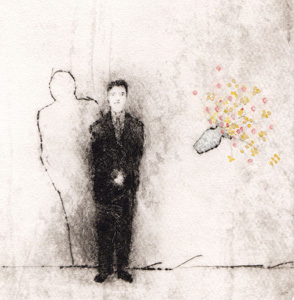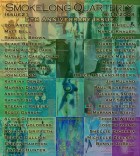Where would the son stand in relation to his dead father? The funeral director placed a line of tape beside the casket.
“Now when you’re speaking you might be overcome, so take a moment to swallow. Some chew gum. I am sorry about your loss. Words don’t convey, I know, but just look sharp. I won’t allow cameras into the viewing. The dead don’t photograph well, take my word, they actually deflect light.”
The funeral director’s back was the size of a blazer larger than the one he wore. One wondered about the stain on his left sleeve: whose fluids? Maybe he was a father who occasionally poured milk on himself. Maybe he was worse. He stood in a corner now but the son knew where he would be after the funeral. He had seen him chatting with his mother after she paid for the casket, brushing off her cheeks, encouraging her to sit with him in a nearby park. The son watched as his mother transformed her misery into wadded tissues she put back in with the clean ones, so the box was globby. He would not have done it that way. He did things with clarity and purpose. He memorized his speech. He did not accept the tissues she passed him. Her grief surpassed his way of dealing.
Now he got by, as far as managing the dull time waiting for the service to begin, folding and refolding the day’s order of condolences: first the priest, then the uncle, then him, then, if she could speak, his mother. As usual his sister could not be counted on to arrive, but she had sent something living that splayed beside the casket. One of her flowers touched the dead father’s face. The dead father looked up into its cup, its lanky sex hanging out and leaving a yellow powder above his eyebrow. This could be where she would kiss him had she been there, had her lips not been fooling around in some other state.
In a corner the funeral director coughed and dimmed the lights. In dimmer light, people cry more fretfully. The son didn’t know where to look. He and the dead father would collect rocks along the railroad tracks and put them in a tumbler. He and the dead father would speed up time’s fumbling. They came home filthy. If they came home bloody, the dead father would use the hose to spray him unbloodied. His skin would be chafed and his mother would try to soothe it. He would pull away and save his game before she could press reset. Then he would watch the screen be controlled by the machine’s ghost hands while his mother’s hands spread the cold cream across his skin, finding a rash where she thought he’d long grown out of being damp. She would say to the dead father, Where are you taking him? Where are you going?
The uncle spoke about being his dead brother’s twin. When the uncle was a boy and stuttered, his dead brother beat up the teasing kids. His dead brother sneaked a BB gun into church and shot the chalice that held the communion juice. When his dead brother was punished, he spent the month in his room reading about reflection and refraction. This segued to his dead brother studying optometry. They all—the uncle pointed to the ones with glasses—saw through his dead brother’s eyes. On “eyes” the son rose. This was his cue. He walked to the podium. On the way he noticed the stain above the dead father’s eye. He pushed away the flower and knocked over its vase. The funeral director rose out of a corner saying, Let me, let me, his constricted arms waving. The son nodded. He could not allow the others to distract him. He knew they counted on him, and had for a while, to say the things they knew but could not say. He had already parted from them, the fleshy family, the way a hand parts from a wave.



